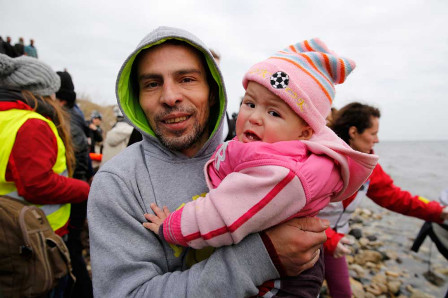 The Jesuit Refugee Service in Europe has launched a new campaign entitled “Journeys of Hope”. Through it, JRS Europe aims to highlight the individual voices, hopes and dreams of people seeking a new, safe life in Europe, by recounting their personal stories and experiences.
The Jesuit Refugee Service in Europe has launched a new campaign entitled “Journeys of Hope”. Through it, JRS Europe aims to highlight the individual voices, hopes and dreams of people seeking a new, safe life in Europe, by recounting their personal stories and experiences.
Danielle Vella, who has travelled all over the world with JRS, accompanying refugees and telling their stories, and Darrin Zammit Lupi, an award-winning photojournalist, have embarked on the journey of hope that so many people are making from Greece through Macedonia and into other European countries. Danielle says what has struck her most on meeting them has been their sheer relief and hope – more than what she calls “their foolhardy courage”, the dangers and deprivations of their journey, and their terrible experiences.
“It seems to me that as soon as they set foot on the shores of Europe, many refugees feel freedom is finally theirs for the taking – freedom from fear, from repression, war, crushing poverty, and the total lack of prospects brought about by some or all the above,” Danielle says. “And so they give full rein to a hope that knows no borders, a hope that refuses to recognise ominous moves within the European Union to threaten their access to protection.”
Danielle’s first report for JRS Europe included harrowing stories of fear and determination, such as the experience of Ahmed and Asyha, who escaped ISIS in Raqqa with their five children.
“When I asked how they felt, they looked at one another and exchanged wide smiles,” she writes. “Ahmed said: ‘Like someone who was dead and has come back to life.’”
Haysem, Ahmed and Asyha shared their stories with Danielle in late January on the Greek island of Lesbos, where they were staying in a family shelter. There Danielle met dozens of people from Syria, Iraq, Iran, Pakistan and Afghanistan who had just reached one or other of the Greek islands from Turkey. They came in a bid to seek asylum and “new life”. They are far from alone in doing so, joining an exodus to Europe that has been going on for years but hit record levels in 2015, when more than 1 million refugees and forced migrants arrived in Europe. In January this year, nearly 69,000 went to Greece.
Danielle has found that the dangers of the journey to seek asylum are not new or surprising: “History has shown that the consequences of travelling clandestinely and depending on unscrupulous smugglers can be fatal. But then those who make the unspeakably difficult decision to embark on such a trip feel they have absolutely no choice.”
Danielle concludes that asylum for the migrants she spoke with will likely be much harder to attain than most imagine. “Although there is plenty of goodwill in Europe, especially among ordinary people and civil society groups eager to extend hospitality, political trends are shifting in the opposite direction,” she says. “At national and EU levels, policymakers are proposing and sometimes implementing measures to tighten border controls and to make asylum policies more restrictive, even offensive to human dignity.
“But negative news does not appear to deter the newly arrived refugees too much. They keep hoping to find at least a safe place, and opportunities to work and to study, and to give their children a happier future – the top priority of every single parent I met. They cling fiercely to hope because they can’t afford to do otherwise. Like millions before them, they have staked everything on their gamble for freedom. And since I met them, all I can think is: How many will find the new life they sacrificed everything for, and what can we do to help them?” [Jesuits in Britain]
Read more about the ‘Journeys of Hope’ Campaign on the JRS Europe website.
Photo caption: Safety after a rubber dinghy arrives on a beach on Lesbos, January 2016 (Darrin Zammit Lupi / JRS Europe).

